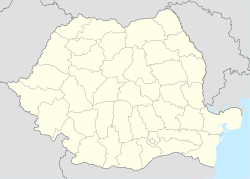Sfântu Gheorghe
|
Sfântu Gheorghe Sepsiszentgyörgy |
|||
|---|---|---|---|
| County capital | |||

Fortified church
|
|||
|
|||
| Location of Sfântu Gheorghe | |||
| Coordinates: 45°51′49″N 25°47′15″E / 45.86361°N 25.78750°ECoordinates: 45°51′49″N 25°47′15″E / 45.86361°N 25.78750°E | |||
| Country |
|
||
| County | Covasna County | ||
| Status | County capital | ||
| Government | |||
| • Mayor | Árpád Antal (from Democratic Union of Hungarians in Romania) | ||
| Population (2011) | |||
| • Total | 54,312 | ||
| Ethnicity | |||
| • Hungarians | 76.91% | ||
| • Romanians | 21.95% | ||
| • Gypsies | 0.77% | ||
| Language | |||
| • Hungarian | 76.58% | ||
| • Romanian | 23.08% | ||
| • Gypsy | 0.04% | ||
| Time zone | EET (UTC+2) | ||
| • Summer (DST) | EEST (UTC+3) | ||
| Climate | Dfb | ||
| Website | http://www.sfantugheorgheinfo.ro/ | ||
Sfântu Gheorghe (Romanian pronunciation: [ˈsfɨntu ˈɡe̯orɡe]; Hungarian: Sepsiszentgyörgy or Szentgyörgy, Hungarian pronunciation: [ˈʃɛpʃisɛnɟørɟ]; Yiddish: סנט דשזארדזש) is the capital city of Covasna County, Romania. Located in the central part of the country and in the historical region of Transylvania, it lies on the Olt River in a valley between the Baraolt Mountains and Bodoc Mountains. The city administers two villages, Chilieni (Kilyén) and Coșeni (Szotyor).
The majority of the city's inhabitants are Hungarians. In the census of 2011, 41,770 (77%) of the city's 54,312 inhabitants classed themselves as ethnic Hungarians, 11,921 (22%) as Romanians, 420 (0.8%) as Roma, and 201 as "others."
Sfântu Gheorghe is one of the oldest cities in Transylvania, the settlement first having been documented in 1332. The city takes it name from Saint George, the patron of the local church. Historically it was also known in German as Sankt Georgen. The "sepsi" prefix (sebesi → sepsi, meaning "of Sebes") refers to the area which the ancestors of the local Székely population had inhabited before settling to the area of the town. The previous area of their settlement was around the town of "Sebes" (now: Sebeș) which later became populated mainly by Transylvanian Saxons.
...
Wikipedia



